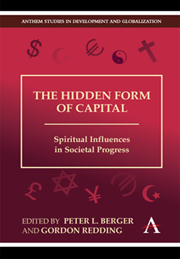Book contents
- Frontmatter
- Contents
- Contributors
- Preface
- Chapter 1 Introduction: Spiritual, Social, Human, and Financial Capital
- Chapter 2 Do Some Religions Do Better than Others?
- Chapter 3 Spiritual Capital and Economic Development: An Overview
- Chapter 4 The Possibilities and Limitations of Spiritual Capital in Chinese Societies
- Chapter 5 How Evangelicanism – Including Pentecostalism – Helps the Poor: The Role of Spiritual Capital
- Chapter 6 Flying under South Africa's Radar: The Growth and Impact of Pentecostals in a Developing Country
- Chapter 7 Importing Spiritual Capital: East-West Encounters and Capitalist Cultures in Eastern Europe After 1989
- Chapter 8 Orthodox Spiritual Capital and Russian Reform
- Chapter 9 Islam and Spiritual Capital: An Indonesian Case Study
- Chapter 10 Separating Religious Content from Religious Practice: Loose and Tight Institutions and their Relevance in Economic Evolution
Chapter 2 - Do Some Religions Do Better than Others?
Published online by Cambridge University Press: 05 March 2012
- Frontmatter
- Contents
- Contributors
- Preface
- Chapter 1 Introduction: Spiritual, Social, Human, and Financial Capital
- Chapter 2 Do Some Religions Do Better than Others?
- Chapter 3 Spiritual Capital and Economic Development: An Overview
- Chapter 4 The Possibilities and Limitations of Spiritual Capital in Chinese Societies
- Chapter 5 How Evangelicanism – Including Pentecostalism – Helps the Poor: The Role of Spiritual Capital
- Chapter 6 Flying under South Africa's Radar: The Growth and Impact of Pentecostals in a Developing Country
- Chapter 7 Importing Spiritual Capital: East-West Encounters and Capitalist Cultures in Eastern Europe After 1989
- Chapter 8 Orthodox Spiritual Capital and Russian Reform
- Chapter 9 Islam and Spiritual Capital: An Indonesian Case Study
- Chapter 10 Separating Religious Content from Religious Practice: Loose and Tight Institutions and their Relevance in Economic Evolution
Summary
There exists today a widespread presumption that all religions must be regarded as of equal worth, and in any event are not to be the object of comparative value judgments. That presumption – let's label it religious relativism, a corollary of cultural relativism – is the dominant one in the West, and surely in our universities. However, when it comes to the relationship between religion and human progress, I find compelling evidence that some religions do better than others in promoting the goals of the UN Universal Declaration of Human Rights: democratic politics, social justice, and prosperity.
Figure 2.1 at the appendix of this chapter is the summary of an idealized typology of 25 cultural factors that are viewed very differently in cultures prone to progress and those that resist it. As you will appreciate, religious doctrine and practice influence virtually all of these 25 factors.
As an example of a religion that is highly resistant to progress, consider Voodoo, the dominant religion of Haiti and a surrogate for the many traditional religions of Africa, the birthplace of Voodoo. Haiti is by far the poorest, least literate, most misgoverned country in the Western Hemisphere. Voodoo is a religion of sorcery in which hundreds of spirits, very human and capricious, control human destinies. The only way to gain leverage over what happens in one's life is to propitiate the spirits through the ceremonial intervention of the Voodoo priests and priestesses.
- Type
- Chapter
- Information
- The Hidden Form of CapitalSpiritual Influences in Societal Progress, pp. 15 - 28Publisher: Anthem PressPrint publication year: 2010
- 2
- Cited by



